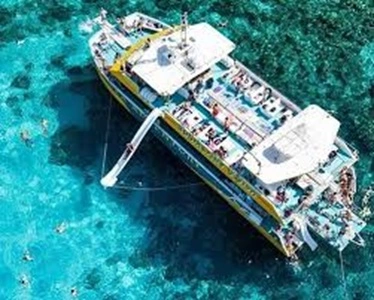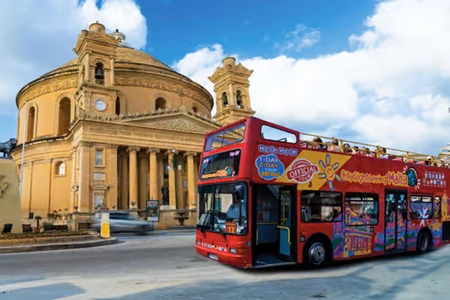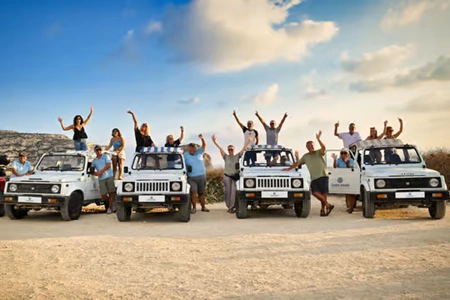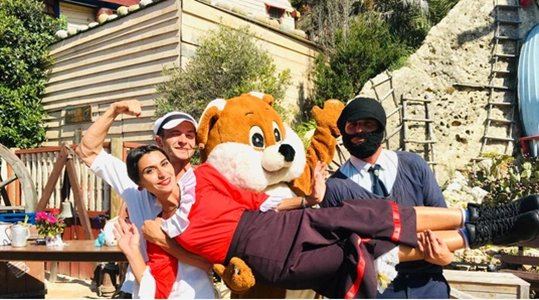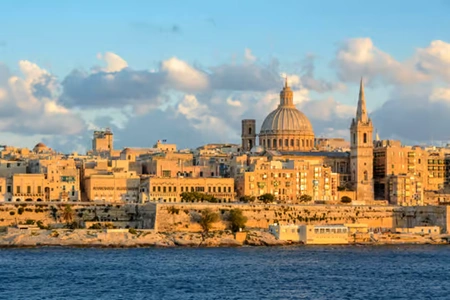The National Public Holiday of Malta.
Below you will find the public holidays in Malta.
Various sights may then be closed. For opening times, we refer to the relevant page of the attraction.
1 January- New Year's Day
Celebrated on the first day of the new year.
It is celebrated with friends and family.
Most places of interest are closed.
10 February - Feast of Saint Paul's Shipwreck
This religious festival is a national holiday in honor of St. Paul.
It is celebrated that when St. Paul was on his way from Jerusalem to Rome he was caught in a violent storm and was shipwrecked against the rocks of Malta. Also called the arrival of St. Paul in Malta.
This shipwreck of St. Paul, AD 60, is recorded in Acts 28 of the Bible. A well-known ceremony and street party is held in and around St Paul's Shipwreck Parish, Valletta.
You will regularly read about St. Paul when reading our descriptions and places of interest in Malta.
19 March - Saint Joseph's Day
The feast day of St. Joseph has been celebrated in Malta since the 10th century AD during Lent on 19 March. During Lent, fish is usually replaced by meat on festive tables.
This holiday is held in Rabat and Mdina. during the day there are various holy masses, colorful processions with accompanying music bands and different bands at various locations.
The relics of Saint Joseph are carried in a procession during the day before the feast. In the evening, the main procession takes place, when the image of Saint Joseph is carried from the National Shrine of Saint Joseph.
Most restaurants, cafes and bars will remain open as usual.
And of course the passion of the Maltese people is featured during the day and evening, the graceful fireworks.
This preliminary work occurs in several places throughout Malta during this holiday.
31 March Freedom Day
It celebrates the withdrawal of British troops and the Royal Navy from Malta.
For the first time in millennium, Malta ceased to be a military base of a foreign power and gained both de facto and de jure independence.
Most important commemorations of this date take place at the Freedom Day Monument in Birgu and at the War Memorial in Floriana.
In the afternoon, the Regatta rowing competition takes place in the Grand Harbour, which attracts thousands of visitors.
The Regatta consists of two annual rowing racing events, the second taking place on Victory Day.
7 April 2023 Good Friday
29 March 2024 Good Friday
On this day, Christians around the world commemorate the crucifixion of Jesus.
Bells do not ring before the start of a holy mass, as a sign of mourning.
There is a joy as evidenced by the name Good Friday.
During the Holy Mass, the Passion of Jesus is remembered.
1 May - worker's' Day
Labor Day is celebrated in more than 80 countries.
It commemorates the efforts (for example the eight-hour working day) that the labor movements make to obtain the currently acquired labor rights and international unity of solidarity.
7 June - Sette Giugno
In Italian it means seven.
The day commemorates some of the revolutions of 1917 - 1923, when Maltese shipyard workers were dissatisfied with being paid less than other workers. There was also general hunger and rising inflation.
It is remembered by name that after a series of riots by the Maltese population, British troops fired into the crowd, killing four people on 7 June 1919.
29 June - Feast of Saints Peter and Paul
St. Peter and St. Paul are considered the two most important apostles responsible for the spread of Christianity in the early years of the first century.
The original Roman Catholic holiday is one of the oldest celebrations in the country dating back to the 3rd century AD and is known in the local language as "L-Imnarja", which is derived from the Italian word "Luminara" (feast of the light).
Late evenings on June 28 in Busket Garden are food stalls presenting festive dishes mainly featuring rabbit and local wine.
On June 29 there are music performances and dances in Rabat. Festive dishes are presented with mainly rabbit. Donkey and horse races are held on country roads near Mdina. Bonfires are also lit.
St. Paul who was shipwrecked on the rocks of Malta, evangelized the island and became the patron saint of Malta. Peter has never been to Malta as far as is known, but is the patron saint of all fishermen and has traditionally been an important industry. According to tradition, both Paul and Peter were executed and buried in Rome. Paul 67 AD and Peter 64 AD. Because crucifixion could not be applied to Roman citizens, he was beheaded and Peter was crucified upside down.
15 August - Assumption of Mary
The Assumption of Virgin Mary is celebrated in Mosta, Għaxaq, Gudja, Ħ'Attard, , Qrendi, Mqabba in Malta and Victoria in Gozo.
Roman Catholics believe that Mary, the virgin mother of Jesus, did not physically die, but instead ascended to heaven.
Ascension Day is celebrated on August 15, unless that date falls on a Saturday or Sunday, then it is sometimes celebrated on the adjacent Sunday.
8 September - Victory Day
Malta has many attacks and wars. Today is celebrated:
- the ending of the Turkish siege in 1565 and the commemoration of the events of 1565. In 1965 the Knights of St. John and the Maltese islanders defeated the Ottoman Turks and saved Christianity from the Saracen threat.
- the end of the blockade of Valletta by the Italian and German navies in 1943.
In the afternoon, the Regatta rowing competition takes place in the Grand Harbour, which attracts thousands of visitors. The Regatta consists of two annual rowing racing events, the first takes place on Freedom Day
21 September - Independence Day
When Napoleon occupied Malta, Britain came to the rescue.
Following Malta's valiant resistance to the Axis powers and loyalty to Britain during World War II, Britain granted Malta self-government.
After this, the movement for independence grew and became increasingly popular.
Malta gained independence from Britain and the Commonwealth of Nations in 1964 and declared itself a republic ten years later.
On September 21, 1964, Malta celebrated its independence from Great Britain.
8 December- Feast of the Immaculate conception
The Immaculate Conception is celebrated throughout Malta.
Often in centered church places with stalls selling confectionery and wine.
Virgin Mary is the patron saint of Bormla (Cospicua).
The annual celebration in Bormla seems to start a week in advance as the lights are hung and banners are unfurled.
Residents bring out icons of the saint and display them behind windows and on balconies.
On the day itself, part of the celebration is that a statue of the Virgin is carried through the streets.
This statue was carved from wood around 1680 by Suor Maria De Domenici. The wood used is said to be a trunk of a miraculous carob tree, on which Our Lady is said to have appeared.
In the 20th century, the statue was clad in silver in Milan in the workshop of Antonio Ghezzi e Figi.
13 December - Republic Day
Op deze dag wordt gevierd de oprichting van republiek Malta en de herziening van de grondwet op 13 december 1974.
In dat jaar werd Sir Anthony Joseph Mamo de eerste president van Malta.
In Valletta worden door een nationale festiviteitencommisie aktiviteiten georganiseerd, met in de avond een grandioos vuurwerkschow boven de Grand Harbour.
25 December- Christmas Day
The birth of Jesus Christ is celebrated on this day.
Malta is then beautifully decorated with lights. Christmas lights flash in every house or on every roundabout.
Upon entering Valletta you are immediately embraced by a warm Christmas feeling. Good quality Christmas music sounds and cozy lighting is hung in shopping streets. Every year something new is organized.
Malta is a top destination during Christmas. CNN has named Malta the best Christmas destination in five years.
